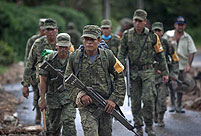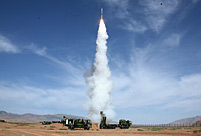China is struggling to combat illegal imports which smugglers conceal in mass freight as the country's logistics industry booms.
On Tuesday, police dumped a large batch of smuggled goods in a landfill in Nanning, capital of south China' s Guangxi Zhuang Autonomous Region. Around 200 tonnes of items were destroyed, including frozen chicken and beef.
In the third quarter of this year, Nanning police have cracked a number of smuggling cases, featuring 2,700 kg of pork of questionable quality and 970 tonnes of other frozen goods.
In recent years, smugglers have turned to disguising banned goods in large cargoes, which have become much more common as the logistics industry expands.
China had 754 distribution parks in 2012, and the logistics industry is on the rise, partly thanks to a low access threshold.
In Guangxi's Dongxing City, which has a population of only about 100,000, there are 89 logistics companies legally in operation. Dongxing, which is under the jurisdiction of Guangxi' s Fangchenggang City, is located on the China-Vietnam border, adjacent to the Vietnamese city of Mong Cai.
Staff in the city's antismuggling office say that it is difficult to fully supervise these companies, and this means a risk of smuggling almost anything, from chemical compounds to frozen meat.
"They hide the contraband in seemingly normal mass freight, so it is hard to spot," said a staff member.
Gao Jianping, captain of the antidrug brigade with Dongxing' s public security bureau, said that earlier this year his team found a van loaded with 20 tonnes of smuggled frozen chicken feet produced in various places around the world. These kinds of products bring quite a risk to the Chinese market, as they do not go through any inspection or quarantine process and could contain a lot of bacteria. The driver seemed completely unaware of what he was transporting, and the boss of the logistics company did not know what was in the freight. The goods had not been checked when they were loaded, according to Gao.
Guangxi is not the only place in the country to have fallen victim to this kind of smuggling. In 2011, police in the southeastern province of Fujian found a large quantity of ephedrine among a cargo of old cotton. This led to the exposure of an illegal logistics chain that transported ephedrine from Vietnam to Fujian to make drugs.
"The consignor told the logistics company that what they sent was just cold medicine and the company never really checked it," local police in Fujian said.
In August last year, border police in Guangxi' s Pingxiang city confiscated 62 kg of drugs in a van supposedly used to transport dragon fruit.
In Guangdong and Shanghai, cases of smuggling via logistics have been reported from time to time, including illegal publications, drugs and various stolen goods.
One factor that has led to the rise in these crimes is that logistics companies mainly transport large cargos, a perfect hiding place for smuggled products, and they are very difficult for inspectors to check.
Some companies do not bother to check loaded goods, nor do they register the names of the consignors, said Mo Yunchao, deputy mayor of Dongxing.
"Even if they do register the consignors' names, it does not help much because these cunning crooks will obviously provide fake information, adding to the trouble of tracking them down," Mo said.
Mo added that a lack of proper laws and regulations and the low cost of this kind of smuggling contributed to the trend.
Another problem is poor cooperation, with each department assuming its own role instead of making joint efforts.
For instance, in Dongxing, the administration of industry and commerce is only responsible for checking the business licenses, while the transportation department just keeps an eye on traffic violations.
Local police place cases on file for investigation and prosecution only when the value of the illegal goods reaches 50,000 yuan (about 8,200 U.S. dollars), which has allowed the illegal wheel of smuggling to keep on rolling. Unless a coordination office is set up, it will be hard to make different departments to work together, said Chu Xuejian, vice chairman of the Shanghai Logistics Association.
Experts are calling for enhanced management in the logistics industry to prevent such crimes.
Zhang Jiasheng, a logistics expert with the Shanghai Lawyers Association, said that different places in China could set up specific regulations to supervise local companies, emphasizing that punishment should be clear and definite.
In addition, a real-name registration system should be in place so that each link in the logistics chain is effectively monitored, according to Zheng Sigan, deputy director of Dongxing' s Administration of Industry and Commerce.
Xue Chao, a regional border control officer, proposed that public security bureaus network with logistics companies to check information provided by logistics staff, while supervising the transported goods via video.
Chu Xuejian suggested that China speed up the building of distribution parks where logistics companies can conduct business and government staff will be able to monitor them more efficiently.
 Storms leave 97 dead, 58 missing in Mexico
Storms leave 97 dead, 58 missing in Mexico New model of indigenous surface-to-air missiles testfired
New model of indigenous surface-to-air missiles testfired  118.28-carat diamond to be auctioned in HK
118.28-carat diamond to be auctioned in HK Maternal love under streetlight
Maternal love under streetlight Naked foreign student sits in the middle of a road in Haikou
Naked foreign student sits in the middle of a road in Haikou  Colorful Yunnan: Enjoy the natural beauty
Colorful Yunnan: Enjoy the natural beauty Harbin named Chinese city with most beautiful women
Harbin named Chinese city with most beautiful women New college students' military training in Guangzhou
New college students' military training in Guangzhou Rugby girls
Rugby girls PLA's 38th Group Army conduct training
PLA's 38th Group Army conduct training Residences of the royal house of Savoy
Residences of the royal house of Savoy The last days of Wan Aihua
The last days of Wan Aihua Highlights at 12th National Games of China
Highlights at 12th National Games of China Beijing Film Academy welcomes freshmen
Beijing Film Academy welcomes freshmen 2013 Taiwan Int'l Tourism Expo kicks off in Taipei
2013 Taiwan Int'l Tourism Expo kicks off in TaipeiDay|Week|Month